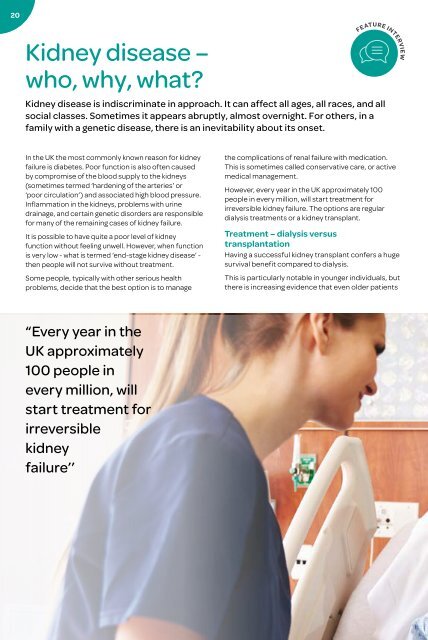Kidney Matters - Issue 7 Autumn 2019
Kidney Matters is our free quarterly magazine for everyone affected by kidney disease. This issue includes a delicious mexico bean nacho recipe from our Kidney Kitchen as well as articles about dialysis away from base, kidney stones, and a feature on looking out for children and young people with kidney disease. We know that being a kidney patient can be tough at times and that accessing the right help at the right time isn’t always easy. We’ve spent a great deal of time over the past year talking to kidney patients on dialysis, asking them what we can do to address this. The response was overwhelmingly ‘improved communication’ on what is going on in the kidney world and what is available to them in terms of support and how to access it. Kidney Matters has been developed to tackle this as well as the many other issues kidney patients face in day-to-day life. Along with shared patient experiences, Kidney Matters provides on how to access emotional and practical support, financial assistance through our grant schemes, advice from leading kidney specialists and tips on how to keep as well as possible by eating a healthy diet whilst on dialysis.
Kidney Matters is our free quarterly magazine for everyone affected by kidney disease.
This issue includes a delicious mexico bean nacho recipe from our Kidney Kitchen as well as articles about dialysis away from base, kidney stones, and a feature on looking out for children and young people with kidney disease.
We know that being a kidney patient can be tough at times and that accessing the right help at the right time isn’t always easy. We’ve spent a great deal of time over the past year talking to kidney patients on dialysis, asking them what we can do to address this. The response was overwhelmingly ‘improved communication’ on what is going on in the kidney world and what is available to them in terms of support and how to access it.
Kidney Matters has been developed to tackle this as well as the many other issues kidney patients face in day-to-day life. Along with shared patient experiences, Kidney Matters provides on how to access emotional and practical support, financial assistance through our grant schemes, advice from leading kidney specialists and tips on how to keep as well as possible by eating a healthy diet whilst on dialysis.
You also want an ePaper? Increase the reach of your titles
YUMPU automatically turns print PDFs into web optimized ePapers that Google loves.
20<br />
<strong>Kidney</strong> disease –<br />
who, why, what?<br />
FEATURE INTERVIEW<br />
<strong>Kidney</strong> disease is indiscriminate in approach. It can affect all ages, all races, and all<br />
social classes. Sometimes it appears abruptly, almost overnight. For others, in a<br />
family with a genetic disease, there is an inevitability about its onset.<br />
In the UK the most commonly known reason for kidney<br />
failure is diabetes. Poor function is also often caused<br />
by compromise of the blood supply to the kidneys<br />
(sometimes termed ‘hardening of the arteries’ or<br />
‘poor circulation’) and associated high blood pressure.<br />
Inflammation in the kidneys, problems with urine<br />
drainage, and certain genetic disorders are responsible<br />
for many of the remaining cases of kidney failure.<br />
It is possible to have quite a poor level of kidney<br />
function without feeling unwell. However, when function<br />
is very low - what is termed ‘end-stage kidney disease’ -<br />
then people will not survive without treatment.<br />
Some people, typically with other serious health<br />
problems, decide that the best option is to manage<br />
the complications of renal failure with medication.<br />
This is sometimes called conservative care, or active<br />
medical management.<br />
However, every year in the UK approximately 100<br />
people in every million, will start treatment for<br />
irreversible kidney failure. The options are regular<br />
dialysis treatments or a kidney transplant.<br />
Treatment – dialysis versus<br />
transplantation<br />
Having a successful kidney transplant confers a huge<br />
survival benefit compared to dialysis.<br />
This is particularly notable in younger individuals, but<br />
there is increasing evidence that even older patients<br />
“Every year in the<br />
UK approximately<br />
100 people in<br />
every million, will<br />
start treatment for<br />
irreversible<br />
kidney<br />
failure’’

















